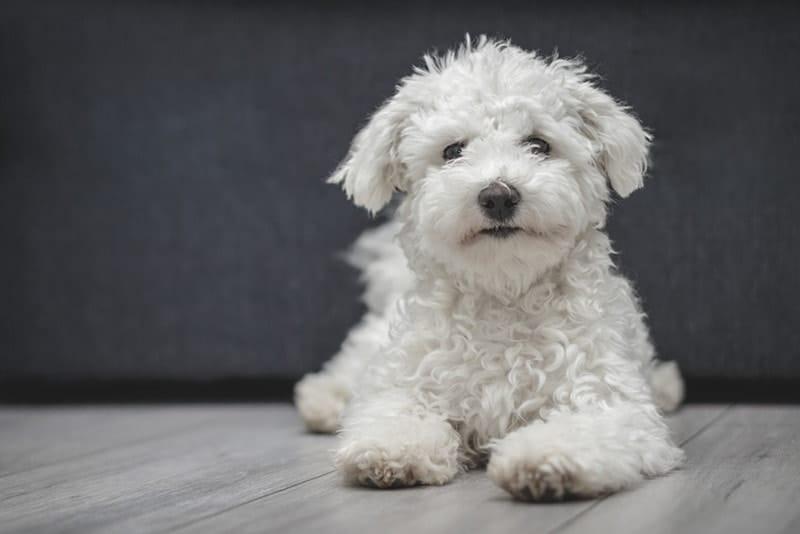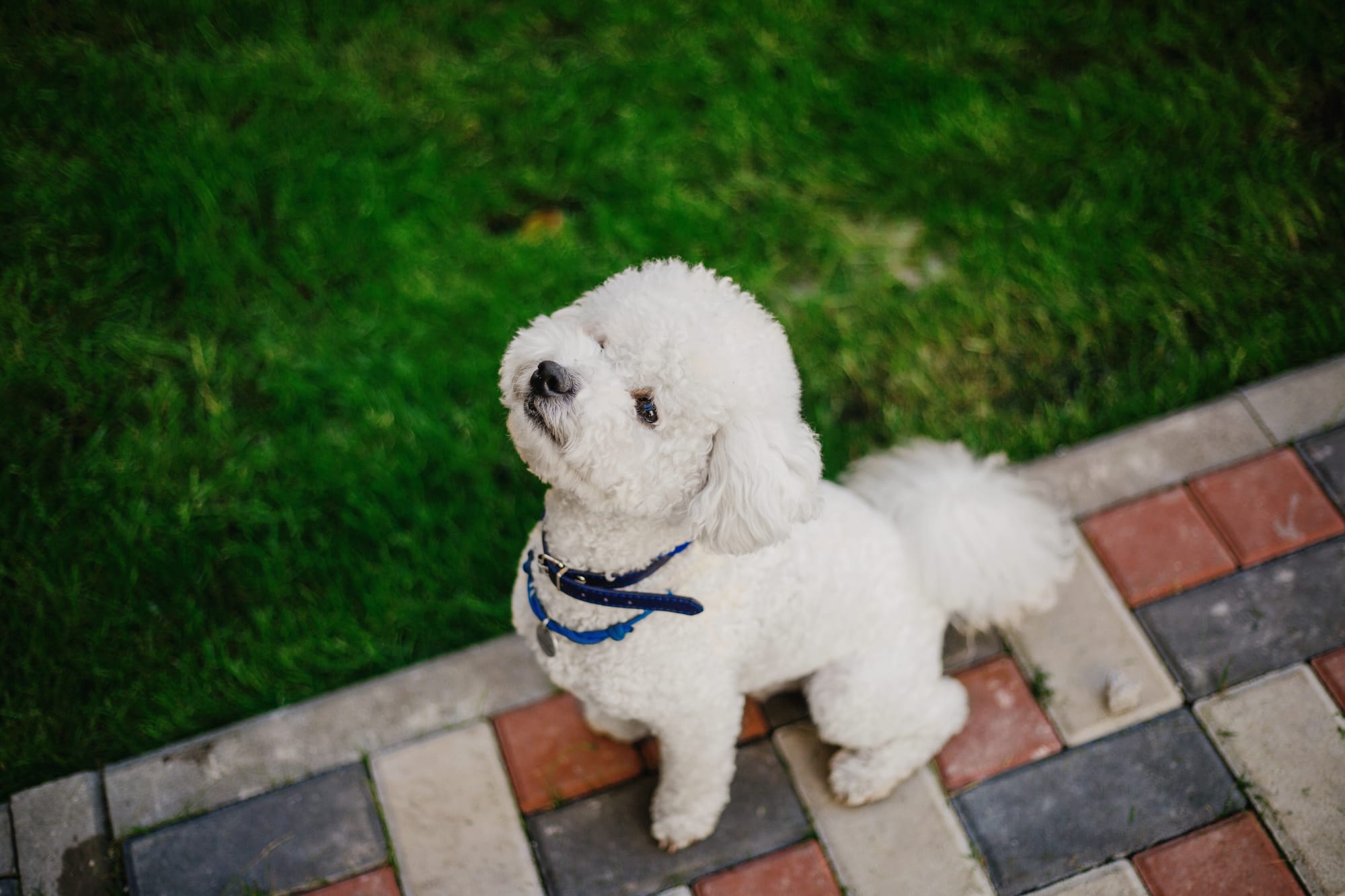Bichon Frise is a small and adorable breed of dog that has become increasingly popular in recent years. One of the most common questions asked by potential owners is whether or not these dogs are smart. The answer is not a simple one, as intelligence can be subjective and can vary from dog to dog. However, some certain traits and characteristics are common among Bichon Frises that can help us determine their level of intelligence.

Firstly, it is important to note that Bichon Frises are highly trainable dogs. They are eager to please their owners and respond well to positive reinforcement training methods. This means that if you put in the time and effort to train your Bichon Frise, you will likely see results. They are also quick learners, which can make the training process easier and more enjoyable for both you and your dog.
Another factor to consider when assessing the intelligence of Bichon Frises is their ability to adapt to new situations. These dogs are known for their friendly and sociable personalities, which can make them great companions in a variety of settings. They are also adaptable and can thrive in both urban and rural environments, as long as they receive proper exercise and attention. Overall, while Bichon Frises may not be the most intelligent breed of dog, they have many other positive qualities that make them wonderful pets for the right owner.

Breed Overview
The Bichon Frise is a small breed that is known for its playful and affectionate personality. This breed is a member of the Non-Sporting Group and is recognized by the American Kennel Club. In this section, we will provide an overview of the Bichon Frise breed, including its origin and history, physical traits, temperament, and personality.
Origin and History
The Bichon Frise has its origins in the Mediterranean region, where it was bred as a companion dog. The breed was popular among sailors and traders, who would take the dogs with them on their travels. The Bichon Frise was also a favorite among French royalty, who kept the dogs as lapdogs.
Physical Traits
The Bichon Frise is a small breed, typically weighing between 10 and 18 pounds. They have a curly, hypoallergenic coat that is white in color. The breed is known for its distinctive round head, black eyes, and black nose. The Bichon Frise has a compact and sturdy build, with a tail that is carried over the back.
Temperament and Personality
The Bichon Frise is a playful and affectionate breed that loves to be around people. They are known for their cheerful and outgoing personality, and they are often described as being "happy-go-lucky." The breed is also intelligent and eager to please, which makes them easy to train. However, they can be prone to separation anxiety if left alone for long periods of time.
Intelligence and Trainability
Bichon Frises are known for their intelligence and trainability. They are quick learners and respond well to positive reinforcement training methods.
Working and Obedience Intelligence
Bichon Frises have above-average working and obedience intelligence. According to Stanley Coren's book "The Intelligence of Dogs," they are ranked 45th out of 138 breeds for working and obedience intelligence. This means that they can understand new commands with fewer than 5 repetitions and obey the first command given 85% of the time or better.
Adaptive Intelligence
Bichon Frises also have good adaptive intelligence. This refers to their ability to problem-solve and learn from experience. They are able to adapt to new situations and environments quickly, making them great travel companions.
Instinctive Intelligence
Bichon Frises have inherent intelligence when it comes to their instincts. They were originally bred to be companion dogs and have a natural ability to read their owner's emotions. They are also great at alerting their owners to potential dangers and strangers.
Overall, Bichon Frises are smart and trainable dogs that excel in obedience and problem-solving. With proper training and socialization, they can make great family pets.

Behavioral Characteristics
Bichon Frises are known for their friendly and outgoing personalities, and they make excellent family pets. They are intelligent dogs that are eager to please their owners, which makes them relatively easy to train.
Socialization and Companionship
Bichon Frises thrive on socialization and companionship. They love being around people and other animals, and they are happiest when they are part of a family. They are very affectionate dogs that enjoy cuddling and being close to their owners. They are also playful and enjoy spending time with children.
Attention and Affection
Bichon Frises require a lot of attention and affection. They are known for being "velcro dogs" because they like to be with their owners at all times. They can become anxious and develop separation anxiety if they are left alone for long periods of time. However, they are also very adaptable and can adjust to different lifestyles, including living in apartments or with busy families.
Barking and Activity Level
Bichon Frises are not excessive barkers, but they will bark to alert their owners of strangers or unusual activity. They have moderate activity levels and require daily exercise to keep them healthy and happy. They enjoy short walks and playing indoors or in a fenced yard.
Overall, Bichon Frises have excellent behavioral characteristics that make them great family pets. They are social, affectionate, and adaptable dogs that require attention and exercise to thrive. They are problem solvers and have emotional intelligence, which makes them good at reading human emotions.
Training Techniques

Bichon Frises are intelligent and trainable dogs. With the right training techniques, they can learn a variety of tricks and commands. Here are some effective training techniques to help you train your Bichon Frise:
Positive Reinforcement
Positive reinforcement is one of the most effective training techniques for Bichon Frises. This involves rewarding your dog with treats, praise, or play when they exhibit good behavior. When your Bichon Frise learns that good behavior results in positive rewards, they will be more likely to repeat that behavior in the future.
Crate Training
Crate training is an effective way to housebreak your Bichon Frise and keep them safe when you're not home. Start by introducing your dog to the crate and making it a comfortable and positive space for them. Gradually increase the amount of time your dog spends in the crate, and always reward them for good behavior.
Housebreaking
Housebreaking your Bichon Frise can take time and patience, but it's a crucial part of their training. Start by establishing a routine for your dog, including regular potty breaks and meals. Use positive reinforcement to reward your dog for going potty outside, and be consistent with your training.
Overall, training your Bichon Frise requires patience, consistency, and positive reinforcement. With the right techniques and plenty of praise, your Bichon Frise can learn a variety of tricks and commands.
Health and Grooming
Common Health Issues
Bichon Frises are generally healthy dogs, but like all breeds, they can be prone to certain health issues. Some of the most common health problems in Bichons include bladder stones, ear infections, cataracts, and diabetes. Regular check-ups with a veterinarian can help catch and address any health concerns early on.
Grooming Needs
Bichon Frises have a fluffy, hypoallergenic coat that requires regular grooming to keep it looking its best. Brushing their coat daily can help prevent matting and tangling, and regular baths can help keep their coat clean and healthy. Bichons also need regular haircuts to maintain their signature fluffy appearance. In addition to coat care, Bichons also need regular dental care, nail trimming, and ear cleaning to maintain their overall health and hygiene.
Diet and Nutrition
Bichon Frises have specific dietary needs to help maintain their health and prevent health issues. They require a balanced diet that is high in protein and low in fat to prevent obesity and other health issues. It's important to choose a high-quality dog food that is specifically formulated for small breeds. Bichons should also have access to fresh water at all times to prevent dehydration.
Overall, Bichon Frises are a healthy and low-maintenance breed that make great lap dogs. With regular grooming, proper diet and nutrition, and regular check-ups with a veterinarian, Bichon Frises can live long, healthy lives.
Living with a Bichon Frise
Bichon Frise is a cheerful and playful breed that makes an excellent companion for families and individuals alike. They are known for their gentle nature and living stuffed animal appearance. However, before bringing a Bichon Frise home, it's important to understand their living requirements and how they interact with other pets and children.
Home Environment
Bichon Frise is a small breed and can adapt well to living in apartments or small homes. They are indoor dogs and thrive in a comfortable and cozy environment. These dogs are people-oriented and enjoy the company of their owners. Therefore, they should not be left alone for long periods of time as they can become anxious and destructive.
Exercise and Playtime
Despite their small size, Bichon Frise is an active breed that requires regular exercise and playtime. Daily walks and indoor play sessions can help keep them physically and mentally stimulated. They are playful dogs and enjoy interactive toys and games with their owners.
Children and Other Pets
Bichon Frise is a gentle and good-natured breed that gets along well with children and other pets. However, they can be sensitive to rough handling and may not be suitable for homes with very young children. Proper socialization and training can help them become more comfortable around other pets and children.
In summary, Bichon Frise makes an excellent companion for those seeking a cheerful and playful dog. They require regular exercise and playtime and thrive in a comfortable and cozy environment. With proper training and socialization, they can get along well with children and other pets.

Choosing a Bichon Frise
When it comes to choosing a Bichon Frise, there are a few things to consider. This breed is known for being smart, affectionate, and playful, making them a great companion for families and individuals alike. However, before bringing a Bichon Frise into your home, it is important to make an informed decision.
Selecting a Breeder
Finding a reputable breeder is crucial when looking for a Bichon Frise. A good breeder will prioritize the health and well-being of their dogs, and will be happy to answer any questions you may have. When selecting a breeder, it is important to ask about the dog's health history, as well as the breeder's breeding practices. A responsible breeder will also provide you with documentation that proves the dog's lineage and health.
Adoption Options
If you are not interested in purchasing a Bichon Frise from a breeder, there are other options available. Animal shelters and rescue groups often have Bichon Frises available for adoption. Adopting a dog can be a rewarding experience, and provides a loving home for a dog in need. When adopting a Bichon Frise, it is important to ask about the dog's history and any medical issues they may have.
Interesting Facts
Bichon Frises are known for their charming personalities and fluffy white coats, but there's much more to them than meets the eye. Here are a few interesting facts about these lovable pups:
- Bichon Frises are often used as show dogs, thanks to their elegant appearance and natural ability to perform tricks and follow commands.
- Despite their small size, Bichon Frises have a bit of an independent streak and can be prone to trying to escape. It's important to keep them on a leash or in a secured area when outside.
- While Bichon Frises are known for their cuddly nature, they also have a playful side and love to engage in games and activities with their owners.
- Bichon Frises are considered to be a relatively smart breed, but their intelligence is subjective and can vary from dog to dog.
Overall, Bichon Frises are a delightful breed that make wonderful companions for those who are willing to put in the time and effort to train and care for them properly.
Conclusion

In conclusion, the Bichon Frise is a wonderful breed that makes an excellent companion for those who are looking for a playful and affectionate dog. Their intelligence and eagerness to please make them easy to train, while their cheerful and outgoing personality makes them a joy to be around. If you are considering adding a Bichon Frise to your family, be sure to do your research and find a reputable breeder who can provide you with a healthy and well-socialized dog.
Frequently Asked Questions (FAQs)
Bichon Frises are adorable, fluffy dogs that are known for their affectionate and playful nature. However, when it comes to their intelligence, many people have questions. Here are some frequently asked questions about the intelligence of Bichon Frises.
- Are Bichon Frises intelligent dogs?
- Yes, Bichon Frises are generally considered to be intelligent dogs. They are quick learners and can be trained to perform a variety of tasks. However, like all dogs, their intelligence can vary from individual to individual.
- Do Bichon Frises require a lot of training?
- Bichon Frises are relatively easy to train, but they do require consistent and patient training. They respond well to positive reinforcement techniques, such as praise and treats. It is important to start training early and to be consistent with your training methods.
- Are Bichon Frises prone to any behavior problems?
- Like all dogs, Bichon Frises can develop behavior problems if they are not properly trained and socialized. Some common behavior problems include separation anxiety, excessive barking, and destructive chewing. However, with proper training and socialization, these problems can usually be prevented or corrected.
- Do Bichon Frises have any health problems?
- Bichon Frises are generally healthy dogs, but like all breeds, they can be prone to certain health problems. Some common health problems in Bichon Frises include allergies, dental problems, and skin conditions. Regular veterinary checkups and proper grooming can help prevent or manage these health issues.
- Do Bichon Frises require a lot of grooming?
- Yes, Bichon Frises require regular grooming to keep their coats healthy and clean. Their coats are thick and curly, which can lead to matting if not properly groomed. Regular brushing, bathing, and trimming are necessary to keep their coats looking their best.
- Are Bichon Frises good companions?
- Yes, Bichon Frises make excellent companions. They are affectionate, playful, and love to be around people. They are great with children and other pets, and are known for their friendly and outgoing personalities.




